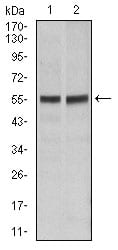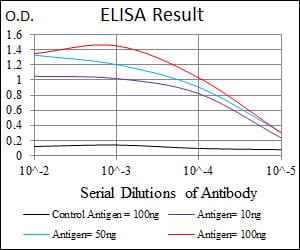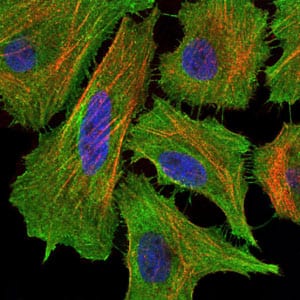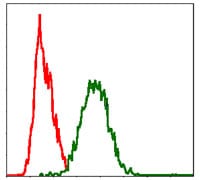



| WB | 1/500 - 1/2000 | Human,Mouse,Rat |
| IF | 咨询技术 | Human,Mouse,Rat |
| IHC | 咨询技术 | Human,Mouse,Rat |
| ICC | 1/200 - 1/1000 | Human,Mouse,Rat |
| FCM | 1/200 - 1/400 | Human,Mouse,Rat |
| Elisa | 1/10000 | Human,Mouse,Rat |
| Aliases | APT1; CD95; FAS1; APO-1; FASTM; ALPS1A; TNFRSF6 |
| Entrez GeneID | 355 |
| clone | 4F8H6 |
| WB Predicted band size | 37.7kDa |
| Host/Isotype | Mouse IgG1 |
| Antibody Type | Primary antibody |
| Storage | Store at 4°C short term. Aliquot and store at -20°C long term. Avoid freeze/thaw cycles. |
| Species Reactivity | Human |
| Immunogen | Purified recombinant fragment of human FAS expressed in E. Coli. |
| Formulation | Purified antibody in PBS with 0.05% sodium azide |
+ +
以下是关于FAS抗体的3篇代表性文献的简要列举(文献信息为示例性概括,具体内容需根据实际文献调整):
---
1. **文献名称**: *Fas-mediated apoptosis in vivo: A study on the role of anti-Fas antibodies in liver injury*
**作者**: Ogasawara J, et al.
**摘要**: 该研究探讨了抗FAS抗体在体内诱导细胞凋亡的作用,发现其可特异性激活FAS受体并导致肝细胞广泛凋亡,为研究FAS信号通路在器官损伤中的机制提供了实验模型。
---
2. **文献名称**: *The role of Fas ligand and Fas antibodies in autoimmune hepatitis*
**作者**: Souza HS, et al.
**摘要**: 通过分析自身免疫性肝炎患者样本,研究发现血清中抗FAS抗体的水平与疾病活动性相关,提示其可能通过干扰FAS/FASL凋亡通路参与免疫耐受失衡。
---
3. **文献名称**: *Anti-Fas antibodies as tools for modulating apoptosis in cancer therapy*
**作者**: Strand S, et al.
**摘要**: 研究评估了抗FAS抗体在肿瘤治疗中的潜在应用,发现部分抗体可选择性诱导癌细胞凋亡,但需通过工程化改造降低对正常组织的毒性风险。
---
4. **文献名称**: *Caspase activation by Fas signaling in vitro: Antibody-dependent mechanisms*
**作者**: Peter ME, et al.
**摘要**: 该文献阐明了抗FAS抗体通过激活caspase级联反应触发凋亡的分子机制,并揭示了不同抗体表位对下游信号通路的差异化调控作用。
---
如需具体文献,建议在PubMed或Google Scholar中检索关键词:**"FAS antibody apoptosis"** 或 **"anti-FAS therapy"**,筛选近年的高被引研究或经典机制论文。
FAS antibodies target the FAS receptor (CD95/APO-1), a cell surface protein belonging to the tumor necrosis factor (TNF) receptor superfamily. The FAS/FAS ligand (FASL) system plays a critical role in regulating apoptosis, immune homeostasis, and immune tolerance. Upon binding to FASL, FAS initiates extrinsic apoptosis through the formation of the death-inducing signaling complex (DISC), activating caspases that execute programmed cell death. This pathway is essential for eliminating autoreactive lymphocytes, maintaining peripheral tolerance, and controlling cytotoxic T cell responses.
FAS antibodies are broadly categorized into agonist or antagonist types. Agonist antibodies mimic FASL, inducing apoptosis in FAS-expressing cells, and are explored in cancer immunotherapy to trigger tumor cell death. Antagonist antibodies block FAS/FASL interaction, potentially mitigating pathological apoptosis in conditions like autoimmune diseases or neurodegenerative disorders. Dysregulation of FAS signaling is implicated in diseases such as autoimmune lymphoproliferative syndrome (ALPS), where defective FAS-mediated apoptosis leads to lymphadenopathy and autoimmunity.
Research tools like monoclonal FAS antibodies are widely used to study apoptotic mechanisms, immune cell interactions, and disease models. However, therapeutic applications face challenges, including hepatotoxicity from systemic FAS activation and the complexity of balancing pro- and anti-apoptotic signals. Despite these hurdles, FAS antibodies remain pivotal in both basic research and clinical exploration for modulating apoptosis-related pathologies.
×